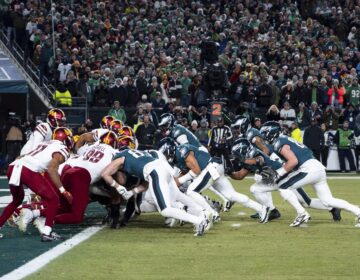Prometheus — and other small radio stations — unbound
West Philadelphia station helps bring about a new law giving low-power outlets better representation on the radio dial.
Grass-roots radio advocates claimed victory over larger corporate broadcasting interests when Congress recently passed a bill that opens up the airwaves to low-power community radio stations.
A key organization in that national campaign was a small group in West Philadelphia called Prometheus Radio.
Prometheus Radio is basically six people working out of a church basement on Baltimore Avenue with a long history in illegal pirate radio. Two years ago they went legit with the single-watt station WPEB, and have been strong advocates for others to do the same.
Congress already allowed for low-power FM broadcasts with a law passed in 2000. There’s a caveat that they don’t overlap with large stations; they must be at least three “clicks” – or points on the radio dial — away from each other.
“That’s a huge distance between one station and another,” said Brandy Doyle, director of policy at Prometheus. “There’s just not that much room in most medium-sized and large cities on the radio dial. Which is why low-power radio has been kept out of most of the country for all these years.”
The new bill shrinks that gap, allowing low-power FM to edge closer to larger stations. That will open up more spaces on the radio dial, particularly in urban areas where the airwaves are crowded.
Heather Sassaman of Prometheus said she has been getting dozens of calls a week from schools, churches and community groups asking how they can start a neighborhood radio station, particularly in immigrant communities.
“In that community, radio is a very appropriate technology,” said Sassaman. “These are folks who have varying levels of English language literacy. When you can put anything from how to apply for jobs or how to enroll in school to news from Somalia to recipes on a radio station, you’re going to activate people.”
The National Association of Broadcasters had been against the bill, but relented when clear regulatory protections were added. President Obama is expected to sign the bill into law, and the FCC will formalize a new application process sometime next year.
WHYY is your source for fact-based, in-depth journalism and information. As a nonprofit organization, we rely on financial support from readers like you. Please give today.




